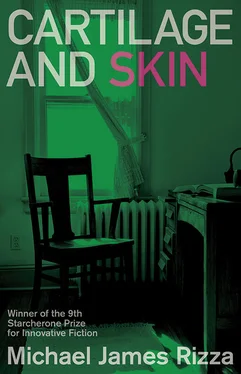“I’m trying to teach him some manners,” Connie said, to which her boyfriend made no response at all.
As the three of us waited at the table, I remembered my hat, and suspecting that politeness called for me to remove it, I set it upon my lap.
In Connie’s story, the boy with the lost cell phone was trying to prevent a chunky, little girl from discarding a purple, slushy drink into the trash. Then the girl’s mother appeared, lumbering up the handicap ramp, with a diapered infant saddled upon her broad hip.
While I was listening to Connie, trying to look interested, though her tale sounded like the pointless rambling of an excited child — Vanessa brought the steamy loaf of salmon to the table. Using a spatula, she served me the first slice and then wordlessly divvied up the rest of it. Before she took her seat beside me, she casually reached into my lap and relieved me of my hat, placing it upon a bottleneck on the cabinet behind me.
I hoped that her presence would rescue me from Connie’s story; however, her boyfriend stirred himself out of his daze, just long enough to ask her, “Well, what happened?”
Apparently, the trashcan was enclosed in a metal bin, and when the cell phone was at last retrieved with the help of a custodian, it was half-submerged in a container of coleslaw. Strangely, the mother cheered in joyful vindication and demanded that the hapless boy apologize to her chunky daughter, who still held the cup of purple slush. Just as I began to suspect that this story was being told for my sake — as though I needed to be entertained — the boy’s fouled cell phone began to ring, and Connie laughed at her own telling of the tale.
As the dinner progressed, I learned that Connie was a freshman taking nine credits at a junior college where I had once taught a single course many years ago at an adjunct’s rate. I was familiar with the name of one of Connie’s hoary professors, whose wife — long before I’d actually met the man — had begun a slow emotional deterioration, ending up in a bed-bound depression. According to the hushed and clipped gossip around the department photocopier and in the lounge, my former colleague — baffled, frustrated, and sad — had seemed to melt away in commiseration for his wife, never fully understanding the putrefaction of her nerves, that is, not until long after she’d finally hanged herself in the basement with a wire clothes hanger. Prior to her problems, she had undergone an innocent hysterectomy, and the doctors back then had failed to recognize how this surgery was connected to her psychological collapse. I always suspected that it was the old man’s personal tragedy that made him a brilliant teacher, for by the time I’d met him, he was already accustomed to living without his wife, avoiding all forms of sociability, and burying his face into book after book.
“He knows everything under the sun,” Connie said.
“Yes,” I said, deciding to keep the details of his history to myself.
“What are you studying?” I then asked Connie.
“Physical therapy,” she answered enthusiastically, but then added, “I think.”
Her boyfriend worked part-time in a factory with large spools of very fine wire, but he wasn’t exactly certain what the wire was used for — perhaps in medical equipment, aviation, or telecommunication. Regardless, the boyfriend’s ignorance didn’t seem to bother him.
Later, under the lowered lights, as we moved from the chardonnay to the zinfandel, and from the dining room table to the couch, none of the particular points of our conversation was significant to me, for I was growing more and more preoccupied by the idea of my departure, and the longer the evening stretched out, the less likely seemed the possibility of Vanessa accompanying me. I had trouble finding the appropriate moment to even hint at the subject.
Connie and her boyfriend were ensconced in their corner of the couch, her forearm resting along his thigh and her head against his shoulder.
I sat upright at the other end, with my knees butting against the coffee table.
Meanwhile, the music had stopped, and Vanessa was squatting in front of the stereo system. In the momentary silence, we heard the wind blow hard against the window. Vanessa looked back over her shoulder and smiled.
“Maybe we’ll get snowbound,” she said.
Once again, my ineptitude revealed itself, for rather than welcome the suggestion of being trapped together and perhaps finding some soft nook in which to snuggle the night away, I felt the urge to leave before it got too late.
“I have to go,” I flatly stated.
“Oh,” Vanessa said, straightening up, her smile now replaced by a mixture of subdued concern and curiosity.
“Not yet,” I said quickly, bumbling. “I just—”
“Well, drink your wine.” She turned back toward the stereo, and as the music resumed, she bent down to sniff one of the candles.
Connie nestled more fully into her boyfriend, so her elbow slipped from his thigh, down onto the couch cushion between his legs, and her arm rested along his crotch.
I looked away. On the end table beside me leaned a solitary picture frame, in which a plump toddler, dressed in pink, was sitting upright on a white carpet. She had a round head, and her small, dark eyes were pinched into slits between her fleshy brow and her round, dimpled cheeks. Despite the child’s giddy expression, she seemed to possess an underlying vacancy, as if at any moment her eyes could become unmoored and drift about in their sockets.
“That’s my angel,” Vanessa said, sitting beside me on the couch.
“She looks happy,” I said.
“Yeah,” Vanessa said, the word seeming to slide out of her, as though she were easing herself into a place as comfortable as a warm bath. “She always knew how to cheer me up. She was a happy baby.”
Rather than respond, I looked at the picture again and attempted to smile at it, as if I could appreciate Vanessa’s memory of the child. Vanessa’s use of the past tense explained to me what I didn’t need to ask.
After a moment, she rescued me again from awkwardness by breaking the silence with a simple explanation: “She had Down’s.”
“What’s her name?” I asked.
“Janis.”
“That’s a pretty name.”
“That was your mom’s name too,” Connie said.
Vanessa nodded. She lifted my drink from the coffee table and handed it to me.
“Let’s put in a movie,” the boyfriend then suggested, which was the first thing he’d said that I actually liked, for talking about the dead child made me uncomfortable. He added, “We still got that rental from the other night.”
Vanessa was looking at me, trying to read my expression. Without turning toward the happy couple, she said, “You guys watch it.” She stood up, and holding my hand, she led me up from the couch.
“We don’t have to watch it,” Connie quickly stated.
“Don’t be silly,” Vanessa said.
The boyfriend leaned forward, forcing Connie to lift herself off of him, as he refilled their two wineglasses.
“You’re spending the night?” Vanessa asked him.
“I’m already snowbound.”
Escorting me toward the dining area, Vanessa spoke directly into my ear: “More like fogbound.”
“I heard that,” he said, and his tone suggested that he was neither offended nor amused, but, as always, simply unmoved.
Vanessa’s mouth was at my ear again, her words rolling velvety and warm from her glistening lips: “The next time I’ll whisper.”
While we sat at the dining room table, with our own bottle of wine between us, the movie sounded in the background and the happy couple stretched themselves out together on the couch, washed in the soft blue light from the television screen, their bodies concealed beneath an afghan. Vanessa began telling me a story about how when she was a little girl her father had taken her to see the birth of a pony. Despite the gore, she had been giddy with excitement and thrilled by the beauty of the event. I nodded, watching her as she spoke, her lips shaping the words, her jaw moving, and the ligaments of her bare throat, ever so easy, stretching and relaxing with the sound of her voice. I listened somewhat dreamily — amid the shifting radiance cast by the television screen and the candlelight swaying in the undulant gloom — to some sensuous strand of Vanessa’s vitality lolling me to a lower rhythm of life.
Читать дальше












